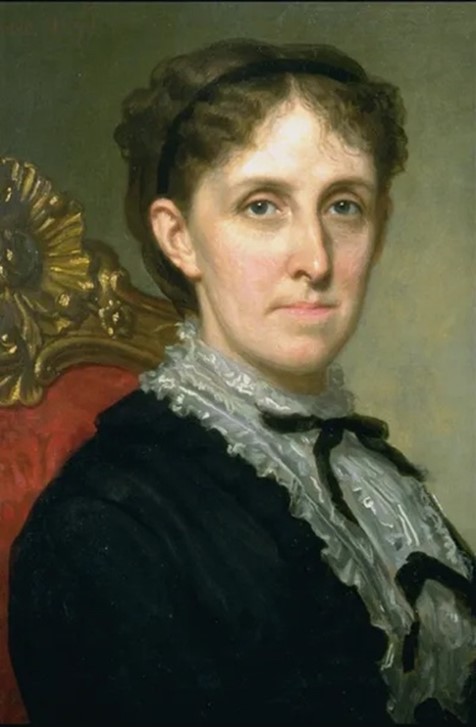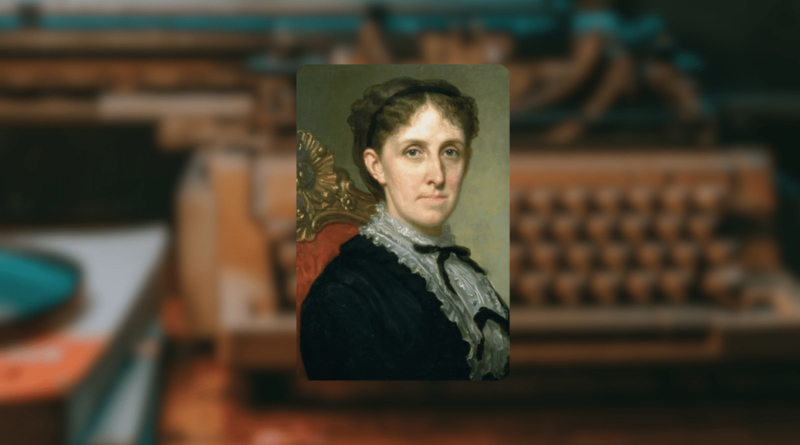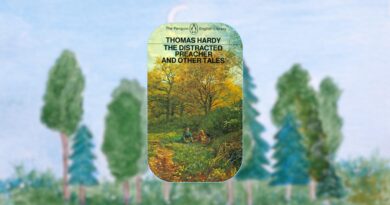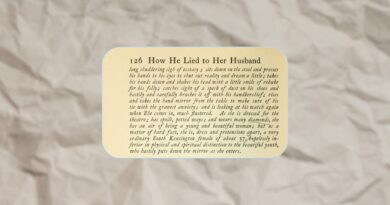A Woman Cinderella For Her Time
A Woman Cinderella for Her Time
Hello everyone, I am Gamze Yıldırım, a graduate of the English Language and Literature Department at Karadeniz Technical University. Under the guidance of my supervisor, Asst. Prof. Dr. Muhammed Baydere, I successfully completed a thesis focused on literary translation. Throughout my thesis, I researched and admired every detail of an extraordinary author: Louisa May Alcott. I delved into her world, befriended her, and spent countless nights working alongside her. You might know her as a writer, but I am not sure how well you know her character. It is impossible to fully convey Alcott and her story in brief, but I have done my best to give you a glimpse of who she is. I believe you will love her and her works because, to me, Louisa May Alcott is an exceptional woman.

In the realm of literature, while some authors may write solely to produce printed works, Louisa May Alcott was not among them. During the Victorian era, societal norms dictated that a woman’s virtue lay in serving her husband and caring for her children at home; any desire to work was considered rebellious. Alcott, best known for her classic Little Women, challenged these limitations and became a pioneer for women. She engaged in activism, defended women’s rights, and used her writing to give a voice to those marginalized by society. Despite the widespread patriarchal belief that “women cannot write,” she continued to publish her works under male pseudonyms when necessary. Alcott, who became her family’s main provider after her father became mentally ill, initially turned to writing for financial support. However, she soon recognized the power of her pen in shaping awareness and began crafting stories aimed at young girls. In her narratives, she continued to focus more on the female experience while dealing with various themes such as love, friendship, and family. As Little Women proves, Alcott’s stories conveyed profound messages to young female readers.
Today, I would like to delve into a short story that forms the basis of the widely popular novel Little Women, first published in 1869. Interestingly, this comprehensive novel originated from a thirty-page short story written by Alcott in 1860 entitled “A Modern Cinderella: Or The Little Old Shoe.” The story, true to its title, alludes to the classic Cinderella fairy tale but sarcastically criticizes the idea of women passively waiting to be rescued by a prince.
In this narrative, the protagonist Nan, despite having someone who could be considered a prince in her life, goes through countless trials alone, takes on her responsibilities alone, and ultimately overcomes difficulties without relying on a savior figure. It is only after the resolution of her trials that Nan and John reach a happy ending.
Another character, Laura, struggles with a dilemma emblematic of many Victorian women: the choice between womanhood and wifehood. Passionate about drawing, Laura neglects her household responsibilities and devotes herself solely to her art. But when love enters her life, she faces the reality that marriage may require her to sacrifice her art. Laura chooses marriage over her art, reflecting the societal expectations placed upon women during the period.
In contrast, her sister Di takes on the role of the family provider and reflects Alcott’s own experiences by writing books to support them after their father’s death. Through the characters of Laura and Di, Alcott clearly illustrates that balancing work and love simultaneously is unfeasible.
In a world where young girls still struggle with this dilemma and women are discouraged from pursuing careers, I translate this story to be able to convey Alcott’s message to a completely different time and place. Translating this short story gives me great pleasure, and at times it also deeply impresses me. I would like to share a passage with you that beautifully reflects her character and spirit, one that I particularly admire.
“Mrs. Lord’s keen eye had read a certain newly written
page in her son’s heart, his first chapter of that romance,
begun in Paradise, whose interest never flags, whose
beauty never fades, whose end can never come till Love
lies dead. With womanly skill she divined the secret; with
motherly discretion she counselled patience, and her son
accepted her advice, feeling that, like many a healthful
herb, its worth lay in its bitterness.” (ST, p. 15)
“Love like a man, John, not like a boy, and learn to know
yourself before you take a woman’s happiness into your
keeping. You and Nan have known each other all your
lives; yet, till this last visit, you never thought you loved
her more than any other childish friend. It is too soon to
say the words so often spoken hastily, so hard to be
recalled. Go back to your work, dear, for another year;
think of Nan in the light of this new hope; compare her
with comelier, gayer girls; and by absence prove the truth
of your belief. Then, if distance only makes her dearer, if
time only strengthens your affection, and no doubt of your
own worthiness disturbs you, come back and offer her
what any woman should be glad to take, my boy’s true
heart.” (ST, p. 15)
“John smiled at the motherly pride of her words but
answered with a wistful look. ‘It seems very long to wait,
mother. If I could just ask her for a word of hope, I could
be very patient then.’” (ST, p. 15)
“Ah, my dear, better bear one year of impatience now than a
lifetime of regret hereafter. Nan is happy; why disturb her by a
word which will bring the tender cares and troubles that come
soon enough to such conscientious creatures as herself? If she
loves you, time will prove it; therefore, let the new affection
spring and ripen as your early friendship has done, and it will be
all the stronger for a summer’s growth. Philip was rash, and has to
bear his trial now, and Laura shares it with him. Be more
generous, John; make your trial, bear your doubts alone, and give
Nan the happiness without the pain. Promise me this, dear,
promise me to hope and wait.” (ST, p. 15)
“Bayan Lord’un keskin gözleri oğlunun kalbinde yeni
yazılmış bir sayfayı okumuştu. Cennette başlayan, ilgisi hiç
azalmayan, güzelliği hiç solmayan, Aşk ölmeden de sonu
gelmeyecek olan o aşk hikâyesinin ilk bölümü. Kadınsı bir
beceriyle sırrı çözmüş, annelik sağduyusuyla sabır tavsiye
etmiş, oğlu da onun tavsiyesini kabul etmişti. John, birçok
şifalı bitki gibi bu bitkinin de değerinin acısında yattığını
hissediyordu.”
“Adam gibi sev John, bir çocuk gibi değil. Bir kadının
mutluluğunu sahiplenmeden önce kendini tanımayı öğren.
Sen ve Nan birbirinizi hayatınız boyunca tanıdınız ama bu
son ziyaretine kadar onu diğer çocukluk arkadaşlarından
daha çok sevdiğini hiç düşünmemiştin. Sık sık aceleyle
söylenen, hatırlanması güç sözleri söylemek için daha çok
erken. Bir yıl daha çalış canım. Nan’i bu yeni umudun
ışığında düşün; onu daha güzel, daha neşeli kızlarla
karşılaştır ve yokluğuyla inancının doğruluğunu kanıtla.
Sonra, aradaki mesafe onu daha da değerli kılıyorsa, zaman
sevgini daha da güçlendiriyorsa ve kendi değerliliğinle ilgili
hiçbir kuşku seni rahatsız etmiyorsa, geri dön ve ona her
kadının almaktan mutluluk duyacağı şeyi, oğlumun içten
sevgisini sun.”
“John annesinin sözlerindeki iftihara gülümsedi ama
hüzünlü bir bakışla cevap verdi: ‘Beklemek için çok uzun bir
süre, anne. Ondan umut edebilmem için bir söz
isteyebilseydim, o zaman daha sabırlı olabilirdim.’”
“Ah, canım benim, bir ömür pişman olmaktansa şimdi bir yıl
sabırsızlığa katlanmak daha iyi. Nan mutlu, neden onu kaygı ve
endişeye sürükleyecek bir sözle rahatsız edesin ki? Onun gibi
sorumluluk bilincine sahip biri zaten çok yakında bu kaygı ve
endişeleri tadacaktır. Eğer seni seviyorsa zaman bunu
kanıtlayacaktır. Bu nedenle bırak yeni başlayan sevgi, ilk
dostluğunuzda olduğu gibi yeşersin ve olgunlaşsın, bir yaz
boyunca daha da güçlenecektir. Philip aceleci davrandı, şimdi de
bunun sıkıntısını çekiyor ve Laura da onunla aynı sıkıntıyı
paylaşıyor. Daha yüce gönüllü ol, John. Kendini dene, kuşkularına
tek başına katlan ve Nan’e mutluluğu acı çektirmeden ver. Bana
söz ver canım, umut edip bekleyeceğine söz ver.”
Through John’s mother, Alcott reminds all young girls and boys that love should be grown with patience and affection without haste, emphasizing that it is not only an emotional bond, but also requires responsibility and respect. This story offers readers more than just an individual love tale; it also encourages them to question the roles of women and men in society and embark on a journey of self-recognition. With this timeless work, Alcott continues to influence and inspire readers throughout the ages. It has inspired me and caught the attention of English readers, leading to both positive and negative reviews on Goodreads. I do not know Italian yet, but translation tools show that it has also touched the heart of an Italian reader. I hope it entertains and leaves a good impression on you too. 😊
References:
- https://www.gutenberg.org/files/3806/3806-h/3806-h.html
Visual References:
- https://louisamayalcott.org/louisa-may-alcott






This is such a thoughtful piece Gamze. I loved how you emphasized Alcott’s subtle critique of societal norms, especially her challenge to the traditional roles of women during the Victorian era. The way you explored Nan’s independence and Laura’s struggle with balancing art and societal expectations was eye-opening. Truly inspiring!